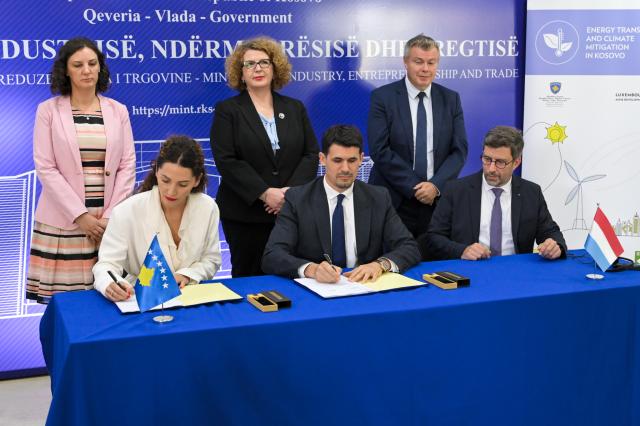Luxembourg and Kosovo join forces to launch Clean Energy Grant Scheme
Kosovo 09.09.2025 Project
© Ministry of Economy

LuxDev, the Luxembourg Development Cooperation Agency, signed an Implementation Agreement with the Ministry of Economy and Kosovo Investment and Enterprise Support Agency (KIESA) on 8 September to launch the Clean Energy Grant Scheme, a EUR 1 million initiative aimed at accelerating Kosovo’s transition to a sustainable, competitive, and resilient economy.
The scheme will provide co-financing grants to support small and medium-sized enterprises (SMEs), particularly in the manufacturing and processing sectors, to invest in:
- renewable energy systems (e.g., solar photovoltaic, solar thermal, battery storage);
- energy efficiency improvements in buildings;
- upgrades to production processes that reduce energy consumption.

© Ministry of Economy
Partnering for growth
The Clean Energy Grant Scheme is implemented by KIESA with the Ministry of Economy providing policy leadership. Meanwhile, the Energy transition and climate mitigation in Kosovo project implemented by LuxDev will ensure coordination, financial management, and oversight. Special attention will be given to women-led and minority-led businesses, promoting an inclusive energy transition.
By reducing energy costs and greenhouse gas emissions, this initiative will directly contribute to Kosovo’s Energy Strategy 2022–2031 and the European Union Green Agenda for the Western Balkans, while strengthening energy security and lowering dependence on imports.
His Excellency Mr. Eric Dietz, Chargé d’Affaires a.i. at the Embassy of Luxembourg in Pristina, stated during the ceremony that this agreement will not only support the development of clean energy generation but also create new jobs, bringing Kosovo closer to European Union standards.
These partnerships reflect Luxembourg’s strong commitment to investing in Kosovo’s economic growth. Through this scheme, we boost the energy transition by directly supporting businesses to invest in clean energy and improve energy efficiency in their production processes.
Mr. Eric Dietz
Chargé d’Affaires a.i. at the Embassy of Luxembourg in Pristina

© Ministry of Economy
On this occasion, the Minister of Economy, Artane Rizvanolli stated that through the Clean Energy Grant Scheme, they are providing businesses with concrete support to help them reduce energy costs, increase competitiveness, and prepare for the liberalised market.
Meanwhile, the Minister of Industry, Enterpreneurship and Trade Rozeta Hajdari emphasised that this scheme will benefit micro, small, and medium-sized enterprises, with a particular focus on those most affected by the liberalisation of the energy market.
Clean Energy Grant Scheme details
The Clean Energy Grant Scheme will provide:
- up to EUR 20,000 for a single measure;
- up to EUR 25,000 for combined measures (measure 1 and 3 or measure 2 and 3).
Implementation is expected to begin soon, with the first calls for applications to be launched in the coming months. This scheme will serve as a model for future green financing, paving the way for larger and more ambitious climate initiatives in Kosovo.
Agreement ceremony gallery
Gallery viewer
About the project
The objective of the Energy transition and climate mitigation in Kosovo project is to promote and facilitate the adoption of energy efficiency and renewable energy sources in Kosovo's transition to clean energy. The project is funded by the Grand Duchy of Luxembourg and implemented by the Ministry of Economy and LuxDev, the Luxembourg Development Cooperation Agency.
Explore more
Discover the latest news from LuxDev and stay updated on the progress of cooperation projects and programmes implemented by the Agency.
All news





